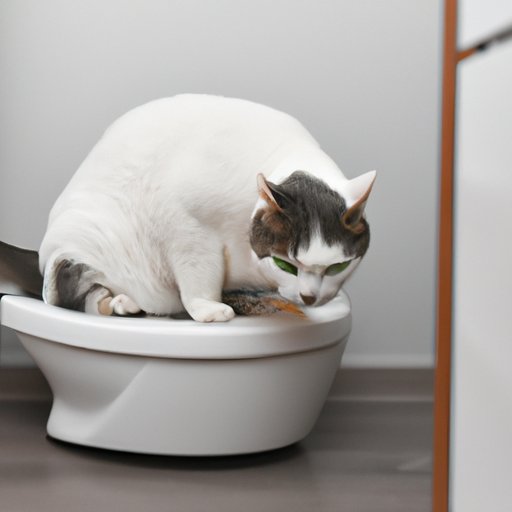I. Introduction
One of the most frustrating problems a cat owner can face is dealing with a cat who pees outside the litter box. This behavior is not only unpleasant but can also be a sign of underlying health or behavior issues. Unfortunately, inappropriate urination is a common issue for many cat owners. According to the ASPCA, litter box problems are the number one reason cats are surrendered to shelters. In this article, we will explore the top reasons why cats pee outside the litter box and provide tips on how to address this issue.
II. The Top 10 Reasons Why Your Cat Might Be Peeing Outside the Litter Box
There are numerous reasons why cats pee outside the litter box. Some of the most common causes include:
- Litter box issues
- Territorial marking
- Stress or anxiety
- Urinary tract problems
- Household changes
- Dirty litter boxes
- Location of the litter box
- Personal preference
- Aggression or competition with other cats
- Old age or illness
For each of these reasons, it’s important to identify the underlying cause and address it accordingly. For example, if your cat is not using the litter box because of a dirty litter box, making sure to clean it more frequently can help solve the problem. Alternatively, if your cat is marking its territory, spaying or neutering your cat can reduce or eliminate this behavior.
III. Understanding Your Cat’s Urinary Habits: A Guide to Preventing Inappropriate Peeing
Understanding your cat’s urinary habits is essential to preventing inappropriate peeing. For example, cats are naturally clean animals and prefer clean litter boxes. Ensuring that your cat has access to a clean litter box is important. Additionally, cats prefer to have their litter box in a quiet, easily accessible location. It’s also important to ensure that your cat has access to fresh, clean water to prevent urinary tract infections.
You may also want to consider the type of litter that you use, as some cats may have personal preferences. For example, some cats prefer unscented litter, while others prefer a specific texture. Experimenting with different litter types can help you find a type that your cat prefers.
It’s important to establish a consistent routine for your cat’s litter box use as well. Feeding your cat at regular times and keeping the litter box in a consistent location can help your cat develop good bathroom habits.
IV. Is Your Cat Trying to Tell You Something? Decoding Their Urinary Behavior
Cats often use urine to communicate with their owners. For example, a cat who is spraying may be trying to mark its territory, while a cat who avoids the litter box altogether may be experiencing anxiety or stress. Understanding the underlying cause of your cat’s behavior can help you address the problem more effectively.
It’s important to monitor your cat’s behavior and note any changes in its urinary habits. If your cat starts peeing outside the litter box, it may be a sign of an underlying behavioral or health issue. Seeking professional help from a veterinarian or animal behaviorist can help identify and address these issues.
V. Common Medical Conditions That Can Make Cats Pee Everywhere
There are several medical conditions that can cause inappropriate urination in cats. Some of the most common medical conditions include:
- Urinary tract infections
- Cystitis
- Kidney disease
- Bladder stones
- Diabetes
- Hyperthyroidism
- Arthritis
If your cat is consistently peeing outside the litter box, it’s important to seek medical attention to rule out any underlying medical conditions. Some of these conditions can be serious or even life-threatening if left untreated.
VI. The Dos and Don’ts of Dealing With a Cat Who Won’t Use the Litter Box
Dealing with a cat who consistently pees outside the litter box can be frustrating and stressful. However, it’s important to remain patient and calm throughout the process. Some tips for dealing with this issue include:
- Advertising the litter box
- Trying different litter types
- Relocating the litter box
- Cleaning the litter box more frequently
- Seeking professional help from a veterinarian or animal behaviorist
- Avoiding punishment or negative reinforcement
- Avoiding aversive cleaning products
- Staying patient and consistent
- Providing plenty of positive reinforcement when your cat uses the litter box appropriately
VII. Conclusion
Cats peeing outside the litter box is a common problem for many cat owners, but it can be addressed and solved. By understanding your cat’s urinary habits, identifying the underlying cause of the problem, seeking professional help if needed, and staying patient and consistent, you can help your cat develop good bathroom habits. Remember, peeing outside the litter box is often a sign of a medical or behavioral issue, so seeking professional help is always the best course of action when dealing with this issue.
